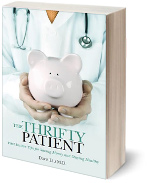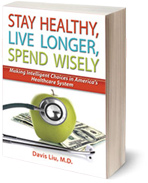Healthcare Future in 2030 – Think Car Insurance. Doctors Will Work for Walmart and CVS.
With health care reform and the creation of a retail marketplace to buy health insurance via exchanges, the future of healthcare delivery has become cost shifting from employers to employees. What will health care look like in 15 to 20 years? Think car insurance and retirement planning. In a future post, I will cover how health care will look like retirement planning.
This new reality will impact both patients and doctors in a very different way.
Auto Insurance – Don’t Use It!
People will trade low premiums for higher deductibles. In auto insurance, people avoid filing claims for fear of increasing future premiums and access alternative services like windshield repair and body shops to get the job done without using insurance.
This will also occur with high deductible health insurance as now it will be essentially catastrophic health insurance and not comprehensive health insurance. This is a perceptive championed by businessman David Goldhill and has intrigued best selling author Malcolm Gladwell.
Patients will seek alternative services outside the traditional health insurance system like doctors and other providers who don’t contract with insurance companies. Unlike the past, this new marketplace will be increasingly filled by doctors either working for themselves, contracting, and bidding for work (Like Priceline for Patients: Doctors compete for business via online bids for surgery). Doctors may work for other companies that provide convenient personalized care in telemedicine.
I have a problem. I need a solution. Better care?
With a $5000 deductible becoming common place, more people will be looking to spend out of pocket for convenient fast care and will have no qualms replacing that for their primary care doctor. I have a problem. I need a solution.
This parallel care system will accelerate the direct to consumer advertising we see in prescription drugs. Doctors and others will step in and fill this new need. Doctors and others will pitch directly to patients. Some of the services of dubious merit when it comes to health. Get a doctor via telemedicine when you get hurt. Walk into drug store or department store and sort through a menu of options to get care in their urgent clinics. Get tested with Life Line Screening or Life Fair ultrasound, because you never know, even though these particular tests in patients with no symptoms has ever been shown to save lives.
This new marketplace rewards those who do more and provide for what the market demands. However, will anyone be willing to fix the unmet demands? At a $5000 deductible, will people use their health insurance to get screened for breast cancer or colon cancer? Who will help monitor and screen for the silent killer hypertension? Ensuring people get vaccinated when needed? With a marketplace mindset of have a problem, fix a problem, preventive care isn’t quite as obvious. Primary care and preventive care is quite invisible. Will another companies form to provide these services and manage health they way they might manage finances for retirement?
With this new behavior where few thousands of dollars come from a patient, will people delay care until it is too late? True consumerism is letting the buyer make choices. A broken windshield or dents in the car door can be ignored. What about urinating blood? Unexplained weight loss? Chest pain that is attributed to heartburn or stress? Will patients be dissuaded to seek care because of a high deductible, find alternative providers to fill that void, or skip care completely only to pay a larger price later?
Who will notice? Who will care?
With health care becoming more like auto insurance, patients having more financial skin in the game, will they get better care?
Perhaps.
For specific problems like hernia surgery, knee surgery, or other areas where the problem and solution are well-defined, care may be more convenient and less expensive. Even for more complex problems, consulting groups will be available for second opinions. In areas of prevention, however, it isn’t as clear. Patients may flock for towards body scans and other tests not proven to save lives but yet are great for marketing and seem to make sense to the average person. This new world truly is Caveat Emptor.
New Opportunities and Risk for Patients and Doctors
Doctors who are entrepreneurial will have an opportunity to set up private practices unfettered from insurance companies. Expect groups of doctors to come together to offer a “hernia surgery” or “knee surgery” center. Specific problems with specific solutions, like a Jiffy Lube. Expect over time for these groups to get larger and nationalized or taken over by larger organizations. Entrepreneurs will setup new systems to employ doctors and either be successful on its own or sell out to larger established Fortune 500 companies. Note how concierge MDVIP practice was sold to Proctor and Gamble before being sold back to Summit Partners, a growth equity firm. Other doctors less inclined to set up their own businesses will be employees for other companies not traditionally thought to provide care – like Walmart and CVS, which changed its corporate name to CVSHealth . It may even come from overseas.
. It may even come from overseas.
As former CEO John Scully noted at a Rock Health innovation summit
“you will see big branded consumer health care services – much like we are comfortable with the national brands Starbucks, Chipotle. It may start as large branded urgent care clinics.”
It will be a whole new world for doctors and patients filled with both new opportunities and risk.
My prediction is the care and health of the country could be even worse than today.
What do you think?
Wouldn’t it be great if you had an easy way to get these answers?
 Get important exclusive advice and tips on how to save money while staying healthy.
Get important exclusive advice and tips on how to save money while staying healthy. Learn how to make intelligent choices in America's Healthcare System.
Learn how to make intelligent choices in America's Healthcare System.
It’s too depressing to think it could possibly get worse. I’m doing my part to do my darndest to move the health ecosystem in the right direction (http://www.rosetium.com/blog/2016/2/23/how-you-can-help-shift-the-health-ecosystem). I’ve seen too many instances where the best way to slash healthcare costs is to *improve* health benefits not to remain optimistic. I published the latest one today – http://www.forbes.com/sites/davechase/2016/03/30/pittsburgh-1st-graders-2b-advantage-over-philly-counterparts/. Smart plan design makes good choices free or near-free and bad choices expensive. Blunt instrument HDHPs will do exactly what you fear — defer stuff until it’s a 5-alarm fire. Let’s shine a light on those doing it right — they are out there. They need to be the heroes — not those just milking the system with massive overtreatment and outrageous pricing.